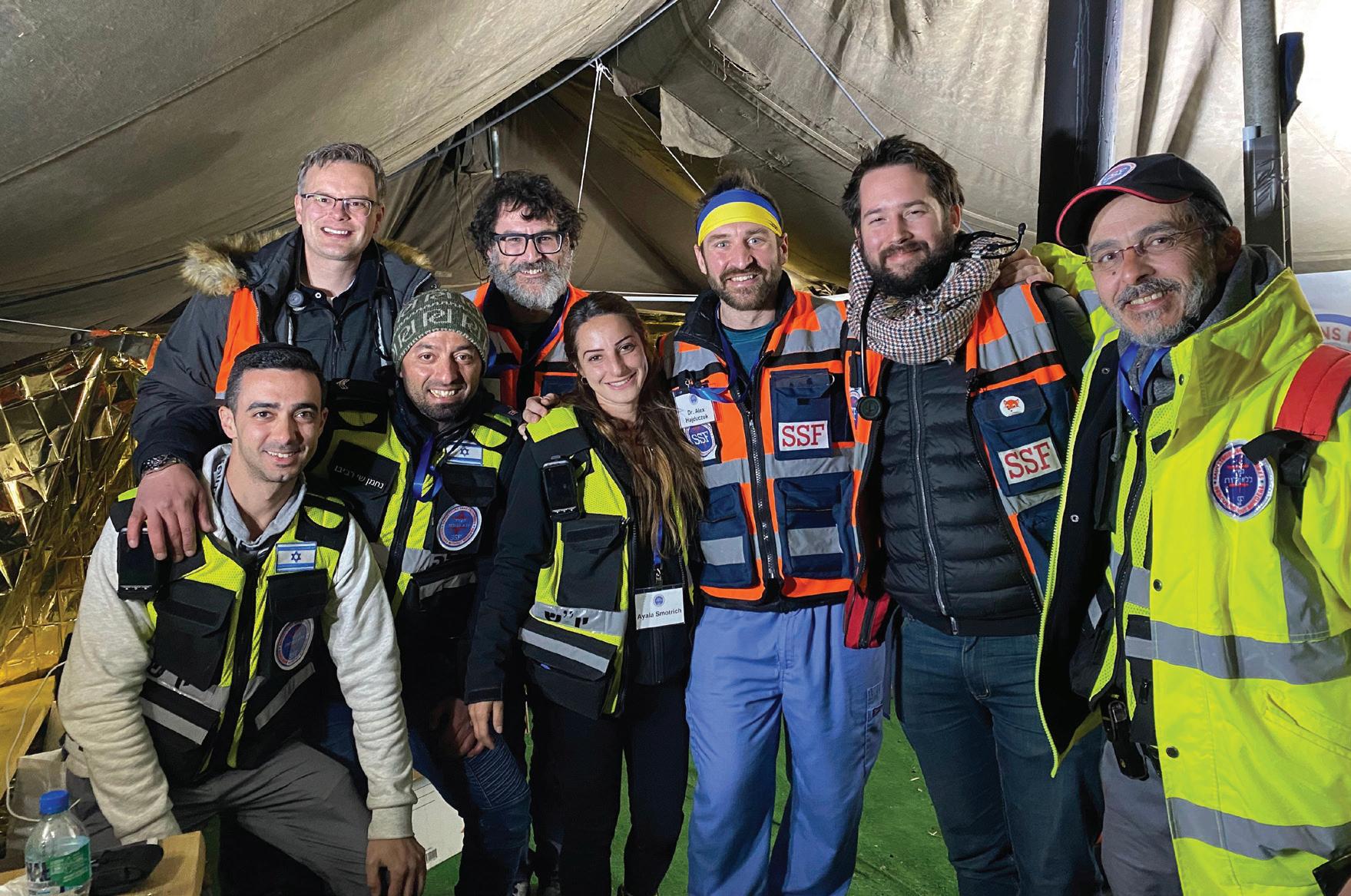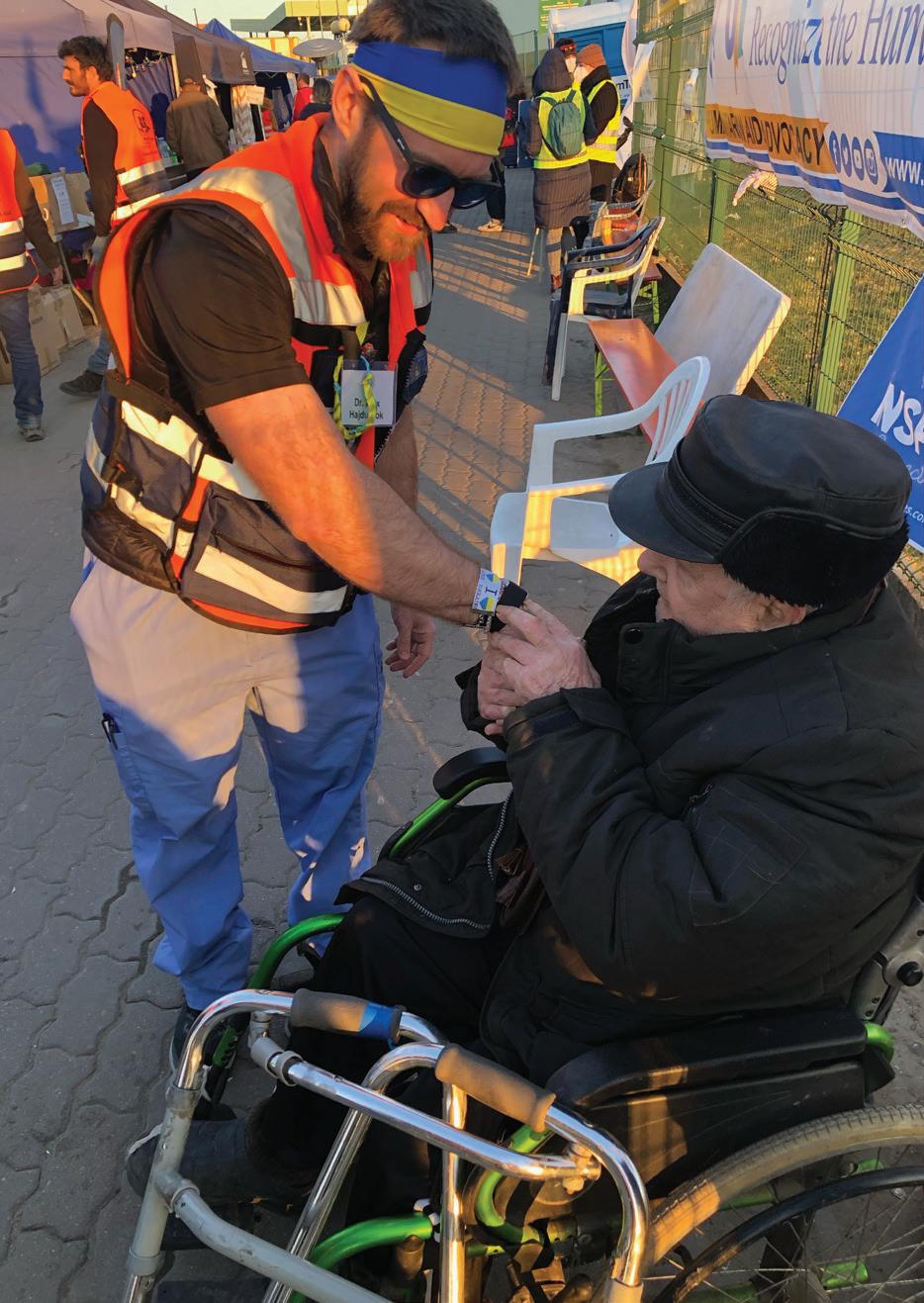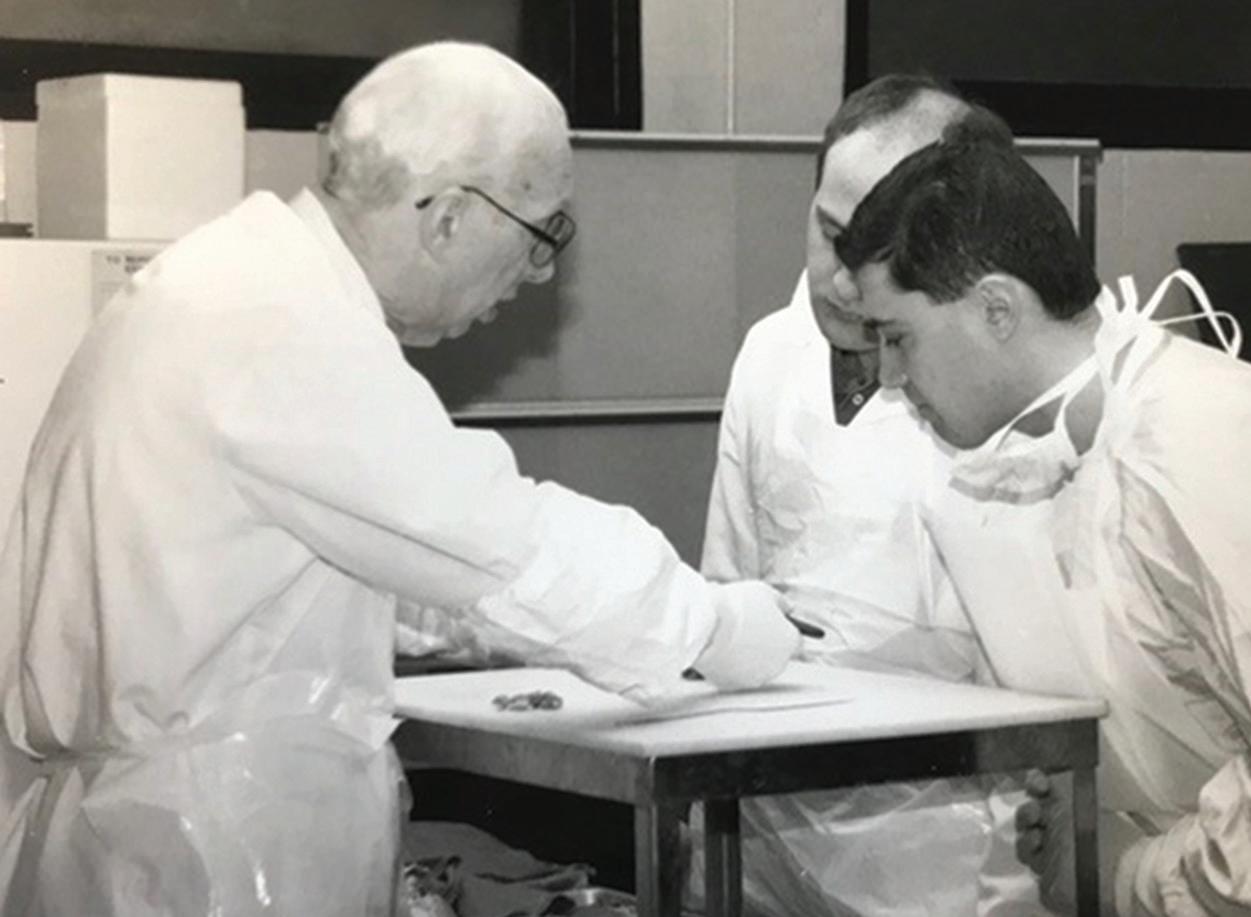
9 minute read
Class Notes
Use the online directory at www.alumniconnections.com/URMC to find contact information for fellow alumni. Submit class notes to your class agent or to RochesterMedicineMagazine@urmc. rochester.edu.
Note: MD alumni are listed alphabetically by class. Resident and fellow alumni follow in alphabetical order, and graduate alumni are listed separately in alphabetical order.
1957
C. McCollister Evarts (Res ‘59, Res ‘64), was honored as an American Osteopathic Association Pillar of the orthopaedic profession.
1966
Hock H. Yeoh retired in 2020 from the Southern California Kaiser Permanente Medical Group, where he served for 45 years. He practiced as a nephrologist and in several other capacities in the organization and was also on the faculty at the UCLA David Geffen School and an attending physician at West L.A. Veterans Administration Hospital and the Kaiser Permanente Medical Center. Currently, he is volunteering with the National Kidney Foundation of Southern California and is a member of the Advisory Council.
1968
Stuart Bauer received the 2021 John W, Duckett, MD, Research Excellence Award from the Urology Care Foundation of the American Urological Association for his contributions to pediatric urology.
1974
John A. Vanek released worldwide the latest book, Bedeviled, in his Father Jake Austin Mystery Series.
1975
Paul V. Williams was recently elected as secretary/treasurer of the American Academy of Allergy, Asthma, and Immunology, a position that will ascend to the presidency in 2024–25.
1976
Timothy E. Quill (Res ’79) published a new book titled Voluntarily Stopping Eating and Drinking: A Compassionate, WidelyAvailable Option for Hastening Death. (See story on page 40.)
1985
Daniel James Briceland (Res ’86) will serve as the 2023 president of the American Academy of Ophthalmology. For more than 25 years, Briceland has worked at both the state and federal levels to protect patients’ right to safe and appropriate eye care. He was elected to leadership by the Academy’s community of 32,000 ophthalmologists.
1990
Bruce Churchill was honored in May 2021 with the inaugural Harvard University Hammonds Award for Exceptional Service to the LGBTQ Community.
Thomas A. Sweeney served as vice-chair of the Department of Emergency Medicine at Christiana Care Health Services in Newark, Del., for 18 years. He is president of the doctors for emergency services, staffing Christiana Care emergency departments and the residency programs with 100 attending emergency physicians and physician assistants.
1992
Charles J. Geilfuss III is retiring from the practice of pathology after 27 years at Trident Health System.
1996
Joshua Goldstein was recently named senior associate dean for graduate medical education and promoted to professor of pediatrics, medical education, and neurology at Northwestern University Feinberg School of Medicine.
1997
Mark E. Basham is co-author of the recently published book Thriving in Academia: Building a Career at a Teaching-Focused Institution. This book provides advice for graduate students and current faculty seeking to build thriving careers at teaching-focused institutions. In the book, he explains how to develop core teaching competencies; choose advising philosophies for mentoring individual students, groups, and clubs; perform high-quality faculty service; and achieve scholarly, creative, and research goals—all while managing a high teaching load. Natalie Ann Bello has been named director of hypertension research in the Smidt Heart Institute’s Department of Cardiology at Cedars-Sinai in Los Angeles. She was previously director of research at the Women’s Heart Center and assistant professor of Medicine at Columbia University Medical Center. In 2018, Bello designed a smartphone app called Love My Heart to educate women about heart disease risk factors and lifestyle interventions. She was selected by Cardiology Today as a Next Gen Innovator in 2018, and by the American College of Cardiology to participate in Clinical Trials Research: Upping Your Game in 2020.
David B. Nash (MD ’81), MBA, who has devoted his career to improving health care quality and patient safety, is co-author of How Covid Crashed the System: A Guide to Fixing American Health Care, scheduled for release in October.
“The pandemic inspired me to further articulate my thoughts in a comprehensive way,” says Nash, who wrote the book alongside author Charles Wohlforth. The authors “pick up the pieces of the Covid disaster like investigators of a crashed airliner, finding the root causes of America’s failure to cope, and delivering surprising answers that may reorient how you think about your own health,” according to publisher Rowman & Littlefield.
Nash is founding dean emeritus and the Dr. Raymond C. & Doris N. Grandon Professor of Health Policy at Jefferson College of Population Health at Thomas Jefferson University in Philadelphia. He returned to the School of Medicine and Dentistry in May 2018 to deliver the commencement address.
Most recently, Nash created a fund to support the Nash Family Summer Research Scholar. Each summer, the fund will support a University of Rochester School of Medicine and Dentistry medical student’s pursuit of patient safety and quality improvement through independent study.
How Covid Crashed the System is available for pre-order at rowman.com.
Standing by wasn’t an option for Alexander Hajduczok (MD ’18), who spent nearly two weeks at the Ukraine-Poland border at the end of March. His Ukrainian heritage wouldn’t allow him to just watch news coverage as more than four million refugees poured across the border seeking safety.
Hajduczok, whose grandparents fled Ukraine after World War II, said his reasons for being there as a medical aide were both personal and professional.
“Watching the news, I kept thinking, ‘I want to help, where can I donate?’” says Hajduczok, a first-year cardiology fellow at Thomas Jefferson University Hospital in Philadelphia. “It wasn’t clear to me how I could help until I connected through people in (my) cardiology network and others on social media.”
A colleague who was also helping at the border suggested he come. Hajduczok paused briefly to figure out how he’d get the time off from his fellowship.
“It was a flood of emotions,” he says. “I just kept coming back to the fact that I couldn’t sit on the sidelines. I emailed the chair of the department and got support from my fellows. I was flying out within three or four days.” Alexander Hajduczok (left) and colleagues at the Ukraine-Poland border.
-Alexander Hajduczok
For 10 days, Hajduczok was stationed in a refugee camp’s field medical tent inside the Polish border in a small town called Medyka, where he and others provided medical aid while frequently crossing the border into Ukraine to drop off supplies and to discuss medical concerns with Ukrainian doctors. “We assembled what we had or had our contacts from home sending supplies and helping facilitate things from afar,” he says. “It was pretty powerful to know that we were helping make a difference in many ways.”
Hajduczok grew up speaking, reading, and writing Ukrainian. His family, including both sets of grandparents, made sure he understood the language and the history of his people. His grandparents were war refugees, driven from their homes when the Soviets crossed Ukraine.
“They were in forced labor camps and were taken to displaced person camps; that’s how one set of my grandparents met,” he says. “Being in Poland at the Ukraine border… my childhood, my upbringing all came back to me there; I grew up speaking 1940s Ukrainian, but I was able to understand mostly everything in general context. It gave me the feeling that I was meant to be there at this time.” Raised in Buffalo, Hajduczok has Rochester roots. His paternal family lived in Webster, and he spent time between both Western New York cities.
Knowing the languages spoken at the border—Russian, Ukrainian, and Polish— certainly helped Hajduczok. However, translations were, at times, muddled or hard to understand. Though he grew up speaking Ukrainian, he hadn’t learned the medical side of communication.
“There was a language barrier, which made it a whirlwind of confusion at times,” he says. “But providing basic medical care to anyone, no matter what language they spoke or what ethnic background they had, came with relative ease.”
Working out of medical field tents, he and others treated people suffering everything from exhaustion, stress, dehydration, and seizures, to more severe cases such as bomb-blast injuries and gunshot wounds resulting in fractured ribs.
In a time of struggle and adversity, he saw people teaming up to help their fellow humans.
“It was inspiring to see people working as one,” he says. “There were so many people pulling together. Everyone helping carry themselves and each other. It’s leveling to see. It kept things stable for those who need security during this time of strife.
Featured on ABC’s World News Tonight in March, Hajduczok recalled being quite emotional during his interview.
“I was choked up; they asked a question and, suddenly, I was filled with emotions,” he says. “It was like waterworks—genuine and from the heart. I wish it wasn’t like that but it sure painted a picture of what it’s like there.”
Back at home, his family was also going through all of the emotions. Hajduczok said his parents were proud, scared, and nervous. He was stationed close to Przemys ’l, a small but developed town (think shopping plazas, houses, schools, etc.). It was unnerving at times to know that people were forced to leave all they had, all they knew, all they had built for themselves, uncertain of ever returning home.
“Yet, despite their great losses, there wasn’t a lot of complaining,” he says. “It was their reality; they are going to start a new life for the time being, many with the hope that they will someday be able to return to their homes and loved ones.”
Coming “home” to Rochester means something else to Hajduczok. He owns a property near URMC that he rents to medical students and visits the area when he can. In addition to his medical degree, his 11 years in Rochester included earning bachelor’s degrees in biochemistry and economics, membership in Delta Upsilon fraternity, and playing hockey with University staff and friends. It was during his time in med school that Hajduczok began to focus on cardiology.
“I fell in love with cardiology and knew this was what I wanted to pursue,” he says. He matched at Penn State University at Hershey for residency, which led him to Philadelphia for his fellowship.
Match Day brought a big opportunity to Hajduczok. He was accepted at Penn State University at Hershey and ultimately landed in Philadelphia, where he is in his first year of cardiology fellowship. He’ll have two more years in this capacity and is looking forward to his future as a cardiologist. While his future is still being determined, Hajduczok continues to keep strong ties to the Rochester area, where his Ukrainian roots took hold. He grew up doing Ukrainian dancing in the Rochester and Buffalo areas and also attended Ukrainian summer camps in Letchworth State Park.
“When I was a kid at camp, we spent long summer weeks in Army tents,” he says. “When I stayed in Poland, they utilized the exact same type of tents. Of course, I knew all of the tent tricks and functions after using them every summer as a kid. Every zipper, stake, nook, and pocket. I remember learning how to waterproof them, and also how to keep the wood-burning stove going. The trick is to never let the fire go out.”
It’s that passion to keep the fire lit that motivates Hajduczok in every aspect of his life.
“We will stay strong and build up the resilience of the Ukraine,” he proudly says.

-Terri Medina







